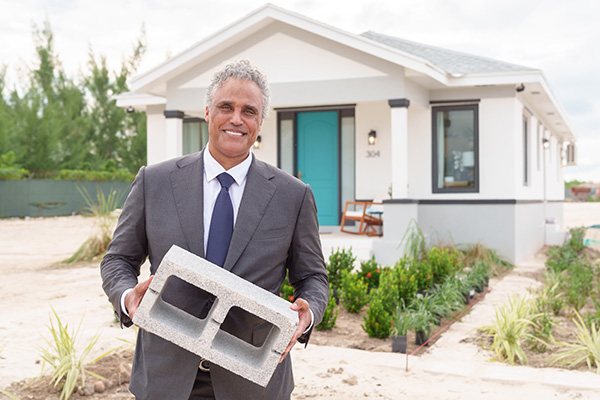Partanna has unveiled the world’s first climate resilient, carbon negative home in the Bahamas.
In a monumental stride for sustainable housing, Partanna Global has unveiled the world’s first climate resilient, carbon negative ‘Home for the World’ in Nassau, Bahamas.
By substituting carbon-intensive Portland cement with a unique blend of natural and recycled ingredients activated by brine, Partanna’s technology forms chemical compounds that interact with and capture atmospheric CO₂.
The 1,250 sq ft. home will actively remove and avoid 182.6 metric tonnes of CO₂ – equivalent to the annual CO₂ absorbed by 5,200 mature trees. Compared to a standard concrete-built home, which generates 70.2 tonnes of CO₂ on production.
The innovative ‘Home for the World’ is the first of 1,000 planned homes announced in partnership with the Bahamian government, as part of an historic agreement signed at COP27. Further details on plans to deliver a further 29 properties, alongside information around future production facilities in The Bahamas are expected in the early part of 2024.
The Honourable Philip E. Davis, K.C., M.P., Prime Minister and Minister of Finance of the Commonwealth of The Bahamas, expressed:
“Standing on the forefront of climate peril, we Bahamians have always been bound by resilience and innovation. Today, as we unveil the world’s first carbon-negative concrete home right here in Nassau, it is a testament that the answers to our global crises often come from those most affected. This cement-free marvel not only absorbs CO₂ but thrives when exposed to seawater.
“I am immensely proud that it is a Bahamian entrepreneur leading this revolution, showing the world that when we say time is running out, we also mean it’s time to build anew. We are not just on the frontline of climate change; we are the frontline of solutions.”
Climate change and increasingly extreme weather events have caused a surge in natural disasters over the past 50 years, disproportionately impacting poorer countries. According to the World Meteorological Organisation, this extreme weather has caused two million deaths and cost over $4 trillion in the past 50 years.
While traditional concrete weakens when exposed to seawater, Partanna’s material strengthens upon contact due to its use of brine, a by-product of desalination – a process crucial for freshwater supply in areas impacted by climate change.
For Small Island Developing States like The Bahamas, which bear the brunt of weather, climate, and water-related hazards, Partanna’s material offers a climate- resilient solution that supports the urgent need for reliable, affordable housing.

Commenting on the unveiling of Partanna’s Home for the World, Rick Fox, NBA legend, Bahamian, and co-founder of Partanna Global, said:
“The world is forecast to build an area equivalent to the size of The Bahamas every three years. The need to disentangle development from pollution has never been more pressing.
“Our ‘Home for the World’ is the answer to this challenge, and The Bahamas, having experienced the devastation of Hurricane Dorian first-hand, is the symbolic birthplace for our movement to change the way the world builds – for good.”
Cement’s responsibility for 9% of global CO₂ emissions, coupled with the UN’s projection of three billion individuals requiring housing by 2030, underscores the magnitude of the challenge. Partanna’s aspiration, moulded by the personal experiences of co-founders Rick Fox and Sam Marshall, is to break this link between development and pollution.
A rapid upscaling of Partanna’s production is on the horizon, with existing facilities in Westlake, LA, and forthcoming expansion into the U.S., accompanied by strategic collaborations with Red Sea Global and Diriyah Company to revolutionize giga-cities in the Gulf.
Partanna’s eco-contribution extends beyond just homes. It yields high-value, Verra- certified carbon credits and has achieved Interrek certification, affirming its concrete’s compliance with global standards. Impressively, in terms of compressive strength, its concrete solution outclasses traditional counterparts, with its standard CMU block estimated to be 25% mightier than a conventional concrete CMU block.
About the Homes
These homes are primed for primarily first-time homeowners in the Bahamas, pre- qualified by the Government.
About Partanna
Partanna is a technology company that helps industries to decarbonize by removing CO₂ naturally. It has pioneered the world’s first building material that avoids emissions and removes carbon from the atmosphere.
Through its application across various industries, Partanna’s technology generates top-performing carbon credits in a fast-growing global market.
About Partanna’s technology
Partanna’s technology harnesses the power of chemistry to both prevent and remove CO₂ emissions. Instead of using Portland cement, it uses a special blend of natural and recycled ingredients.
The technology uses brine to activate a pozzolanic binder. This process creates chemical compounds that react with carbon dioxide in the air. This mixture is then cured at room temperature, avoiding the energy-intensive clinkering process associated with traditional cement production.
As the CO₂ dissolves into the mix, it helps create a novel type of binding agent that serves the same purpose as traditional cement. These reactive compounds then continue to absorb CO₂ throughout Partanna’s building materials’ lifecycle.
Scott Ellyson, CEO of East West Manufacturing, brings decades of global manufacturing and supply chain leadership to the conversation. In this episode, he shares practical insights on scaling operations, navigating complexity, and building resilient manufacturing networks in an increasingly connected world.